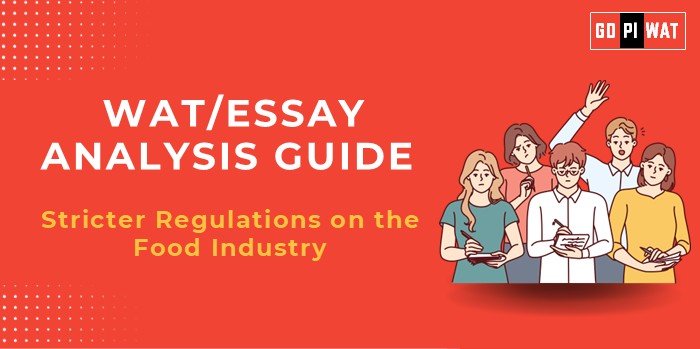📋 WAT/Essay Analysis Guide: Stricter Regulations on the Food Industry
🌐 Understanding the Topic’s Importance
Stricter regulations address pressing public health issues by ensuring transparency and healthier food options while balancing economic factors. This aligns with broader socio-economic and sustainability goals relevant to B-schools.
📝 Effective Planning and Writing
- ⏳ Time Allocation:
- 📑 Planning: 5 minutes
- ✍️ Writing: 20 minutes
- 🔍 Review: 5 minutes
- 💡 Preparation Tips: Identify key health statistics, case studies (e.g., Denmark, Chile), and stakeholder impacts.
🎯 Introduction Techniques
- Contrast Approach: “While obesity has reached epidemic levels globally, many governments hesitate to regulate the food industry, highlighting the conflict between health and profit.”
- Solution-Based Approach: “Implementing strict food industry regulations, as seen in Chile and Denmark, offers a path to reducing health crises like obesity and heart disease.”
- Data-Driven Start: “With over 13% of the global population classified as obese, the link between unhealthy food and public health demands urgent government action.”
🔍 Structuring the Essay Body
- 🏆 Achievements: Highlight successful case studies like Denmark’s trans fat ban and Chile’s labeling laws. Discuss their measurable impacts.
- ⚖️ Challenges with Comparative Analysis: Address economic resistance, implementation barriers in developing countries, and consumer behavior.
- 🌍 Future Outlook: Explore opportunities for global standards, public-private partnerships, and incentives for healthier products.
💡 Concluding Effectively
- Balanced Conclusion: “Stricter regulations are pivotal in addressing public health concerns but require balanced implementation to ensure industry and consumer cooperation.”
- Global Comparison Conclusion: “Countries like Denmark and Chile have proven the effectiveness of food regulations, showcasing a roadmap for others to follow.”
📊 Analyzing Successes and Shortcomings
- ✅ Key Achievements: Proven public health benefits, increased transparency.
- ⚠️ Ongoing Challenges: Economic backlash, regulatory compliance.
- 🌐 Global Context: Learning from pioneering nations like Denmark and Chile.
✨ Recommendations for Sustainable Progress
- 💵 Introduce progressive tax incentives for healthier product reformulation.
- 🌍 Establish international regulatory frameworks for consistency.
- 📚 Promote consumer education to drive demand for healthier choices.
✍️ Sample Short Essays
- Balanced Perspective: “While stricter regulations on the food industry are essential for combating obesity and NCDs, their implementation must balance health benefits with economic sustainability.”
- Solution-Oriented: “Introducing phased food labeling laws and incentivizing reformulation can help governments address public health crises effectively.”
- Global Comparison: “Denmark and Chile provide compelling examples of how targeted food regulations can lead to significant public health improvements.”


